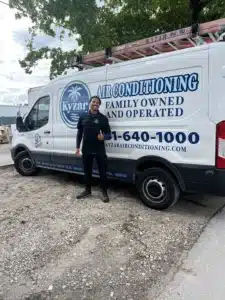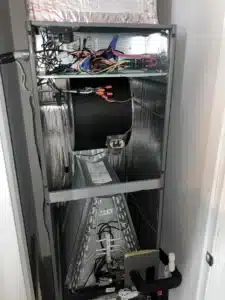Smart Cooling Strategies for Lower Energy Bills in West Palm Beach Homes
Living in West Palm Beach means living with heat, humidity,...
The functionality of air conditioning systems often sparks curiosity, with one common question being whether air conditioners bring in fresh outdoor air. In this blog post, we’ll provide a straightforward and factual explanation of how air conditioners operate concerning outdoor air intake.
Contrary to some common misconceptions, traditional residential air conditioning systems operate as closed or sealed systems. In other words, they do not typically bring in fresh outdoor air. Instead, they recirculate and cool the air already inside your home.
While air conditioners focus on cooling indoor air, ventilation systems are responsible for introducing fresh outdoor air. Some modern HVAC systems integrate ventilation components to enhance indoor air quality. However, the primary function of air conditioning units is to regulate temperature, not to replace indoor air with fresh outdoor air.
It’s essential to note that there are exceptions to this rule. Some advanced HVAC systems come equipped with ventilation features, such as energy recovery ventilators (ERVs) or heat recovery ventilators (HRVs). These systems exchange a controlled amount of indoor air with fresh outdoor air while recovering energy from the exchanged air, improving efficiency.
While air conditioners don’t bring in fresh outdoor air by default, maintaining good indoor air quality is still crucial. Regular maintenance, including filter replacement and duct cleaning, contributes to cleaner indoor air by removing dust, allergens, and pollutants that may accumulate over time.
If increasing ventilation and introducing fresh outdoor air is a priority for your indoor environment, consider consulting with HVAC professionals. They can assess your existing system and discuss options such as dedicated ventilation systems or air purifiers to meet your specific needs.
Introducing large amounts of outdoor air directly can impact the energy efficiency of your HVAC system, especially in extreme weather conditions. Systems designed for energy efficiency balance the need for fresh air with the energy demands of heating or cooling, ensuring optimal performance.
In summary, traditional air conditioners primarily recirculate and cool the air within your home. If your goal is to improve ventilation or introduce fresh outdoor air, additional considerations and modifications to your HVAC system may be necessary. For personalized advice and solutions tailored to your indoor air quality needs, speak to a skilled and experienced HVAC company.

Living in West Palm Beach means living with heat, humidity,...

Florida HVAC systems work harder than those in almost any...

Indoor air quality plays a major role in how a...

Ventilation is one of the most important yet often overlooked...

In Florida, air conditioning is not a luxury. It is...

Many homeowners assume that central air conditioners pull fresh air...